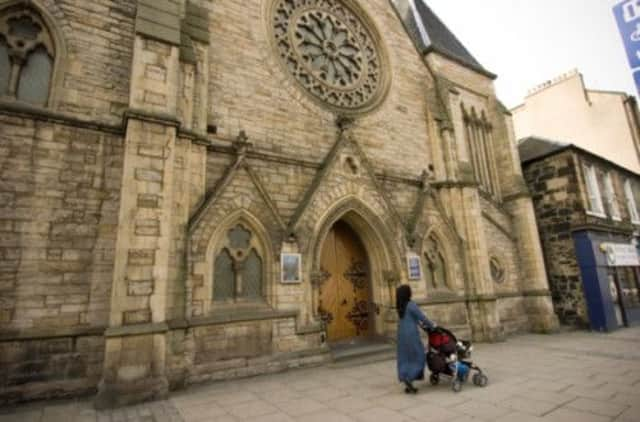Comment: Fall in numbers doesn’t add up to irrelevance


MEDIA headlines might have highlighted decline, but according to the figures released from the census last week, a significant number of people in Scotland – 54 per cent of those questioned – say they belong to a church. Too quickly we have accepted the caricature that to be a Christian today is to be a “religious anorak”. Surprisingly, to some, the Church still plays an important part in today’s Scotland.
People still turn to the Church at significant moments in their lives. We laugh about “hatches, matches and dispatches” but recognise the importance in all lives of birth, marriage and death. Whether through baptism or a service of blessing, people are still prompted by the birth of a child to seek afresh a faith from which they have drifted or only known through vague memory.
Advertisement
Hide AdAdvertisement
Hide AdToday many membership classes are made up, not of adolescent teenagers going through a rite of passage, but people in their thirties. They are looking for something beyond themselves to make sense of their lives, hold their marriage together and give help in the demanding business of bringing up a family. Whether they come out of faith, convention or superstition, they sometimes discover that there is substance to the Christian faith and for them it truly becomes “good news”.
Less than a year before the vote on independence, the results of Scotland’s 2011 census paint a picture of contemporary Scotland and its people. Mark Twain said “facts are stubborn but statistics are more pliable”, however, the census deserves to be taken seriously. Many stakeholders in a future Scotland will be looking over its findings in the months to come. Whichever way the referendum vote goes, both the snapshot it provides and the changes it heralds since the last census in 2001, matter.
The Church welcomes the publication of these detailed figures, even if they do not always make for easy reading. Within the Church of Scotland, the decline, by 10 percentage points, among those who say they belong to the Church of Scotland, is serious, but not surprising and is in line with our annual statistics. The Church always has a tension of being faithful to its past and relevant to its present and we can, all too often, be out of step. One response has been our launch this week a partnership with Fresh Expressions, an ecumenical organisation helping to plant new congregations alongside more traditional forms.
One surprising figure is that, with an adult membership of just over 400,000, more than four times that number – 1.7 million – say that they still belong to the Church of Scotland. This may simply reflect the cultural shadow the Church still casts over our country and its significant influence on our history. Perhaps, however, it also reflects the fact that the Church serves the whole country and that ministry is still appreciated and respected throughout the land.
The Church of Scotland is called a national church, not just as a legacy of its past, but because it genuinely wants to serve all the people of this land, religious or irreligious, church-goer or sceptic. That is why its ministers are parish ministers, serving all the people in a defined area, and not just ministers of congregations.
I was amazed to discover the other day that last year Church of Scotland representatives took more than 25,000 funerals, which, as only a statistician can tell you, represents around one funeral being held every 20 minutes, day and night, every day of the year.
One of the most revealing statistics in the census is the increase in the numbers of people who live alone. How easy it is to be lonely even with people all around. In many communities the Church’s facilities are a building block of community life. They are used for toddlers or playgroups, for special interest groups from keep fit to country dancing, and for community meetings, and they also might serve as a social centre for older people, as lunch clubs and a place where they can find time to chat over a game of dominoes. In all these ways the Church provides a place where people can meet together. And, of course, at its heart lies worship and opportunities to explore and live out the Christian faith.
The Church, through its congregations, serves people in their need. The recent mushrooming of food banks to meet the reality of the recession is one example, as has been the setting up of breakfast clubs to ensure school children start the day with a decent meal. Many churches host meetings of AA groups, where privacy is respected and help is found. The European Anti-Poverty Network has recently recognised the work of our Priority Areas team through an award for their role in the fight against poverty and social exclusion.
Advertisement
Hide AdAdvertisement
Hide AdSpecialist care for the vulnerable is provided through the extensive work of Crossreach, the largest provider of social care in Scotland, and advocacy for issues of justice and compassion take place through the Church and Society Council. All these and their parallels in other denominations contribute to why so many believe that whatever choice Scotland makes next year, the voice of the Church still deserves to be heard.
And finally the Church wants to share its faith, believing it still can transform lives. The growth of those who say that have no religion, whether through conviction or not, challenges the Church not only to love and serve their neighbour but also explain why they follow Jesus Christ and why he is worth following.
• Colin Sinclair is the convener of the Mission and Discipleship Council and minister of Palmerston Place Church of Scotland in Edinburgh.